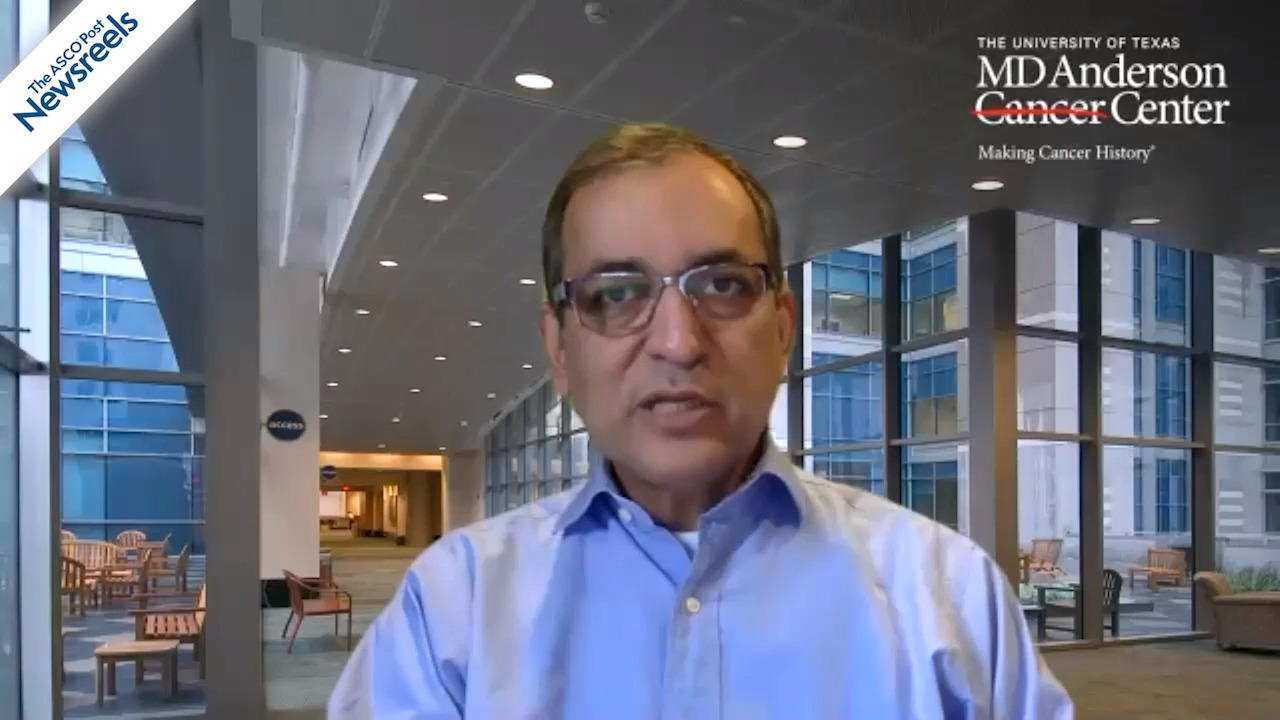FDA Approves TheraSphere Y-90 Glass Microspheres for Unresectable Hepatocellular Carcinoma
Today, the U.S. Food and Drug Administration (FDA) approved TheraSphere Y-90 Glass Microspheres, developed for the treatment of patients with hepatocellular carcinoma. The approval expands access to this therapy, which, to date, has been utilized under a humanitarian device exemption—an FDA...
FDA Oncologic Drugs Advisory Committee to Review Status of Six Indications Granted Accelerated Approval
Recently, the U.S. Food and Drug Administration (FDA) announced that the agency will hold a public meeting of the Oncologic Drugs Advisory Committee on April 27 to 29 to discuss six indications granted accelerated approval that have since reported results from confirmatory trials that have not...
In Cholangiocarcinoma, Does Chemotherapy Response Vary According to FGFR2 Status?
With inhibitors of fibroblast growth factor receptor 2 (FGFR2) fusion and other genetic alterations now in clinical trials for cholangiocarcinoma, there is interest in better understanding what FGFR2 genetic alterations mean for patients. In particular, little is known about the effects of FGFR2...
Oncologist Survey Identifies Knowledge Gaps in Cholangiocarcinoma Mutations
In the treatment of cholangiocarcinoma, many clinicians may be unaware of the importance of the major oncogenic mutations and other alterations that can be identified and targeted, according to a survey of oncologists presented at the 2021 Gastrointestinal Cancers Symposium.1 “Recent developments...
Expert Point of View: Rachna T. Shroff, MD
Invited discussant of the ClarIDHy trial, Rachna T. Shroff, MD, Associate Professor of Medicine, University of Arizona, and Chief of GI Medical Oncology at the University of Arizona Cancer Center, said positive findings for ivosidenib support the notion that “biliary cancer is a perfect example of...
ClarIDHy Trial: IDH1 Inhibitor Ivosidenib Benefits Survival in Cholangiocarcinoma
Ivosidenib, an inhibitor of isocitrate dehydrogenase 1 (IDH1), improved overall survival by almost 3 months in previously treated patients with advanced IDH1-mutated cholangiocarcinoma, compared with placebo, researchers of the global phase III ClarIDHy trial reported at the 2021 Gastrointestinal...
FDA Pipeline: Priority Reviews for Immunotherapies in Gastric Cancers, Anal Cancer
The U.S. Food and Drug Administration (FDA) recently granted Priority Review to nivolumab as either adjuvant or first-line therapy in several types of gastric cancers, as well as to a novel PD-1 inhibitor for locally advanced or metastatic squamous cell carcinoma of the anal canal. The FDA also...
Andrew X. Zhu, MD, PhD, on IDH1-Mutant Cholangiocarcinoma: Ivosidenib vs Placebo
Andrew X. Zhu, MD, PhD, of Massachusetts General Hospital, discusses final results from the phase III ClarIDHy study, which showed that ivosidenib may improve overall and progression-free survival compared with placebo in patients with previously treated cholangiocarcinoma and an isocitrate dehydrogenase 1 mutation (Abstract 266).
Richard S. Finn, MD, on HCC: Atezolizumab Plus Bevacizumab vs Sorafenib
Richard S. Finn, MD, of the UCLA Medical Center, discusses updated results from the IMbrave 150 study, which showed atezolizumab plus bevacizumab provides the longest overall survival seen in a front-line phase III study in advanced hepatocellular carcinoma, confirming this combination as the standard of care for patients with previously untreated, unresectable disease (Abstract 267).
Milind M. Javle, MD, on Cholangiocarcinoma: Treatment With Infigratinib
Milind M. Javle, MD, of The University of Texas MD Anderson Cancer Center, discusses phase II study results showing that the novel tyrosine kinase inhibitor infigratinib may prove to be effective in treating patients with advanced cholangiocarcinoma harboring an FGFR2 gene fusion or rearrangement (Abstract 265).
IDH Inhibitor Ivosidenib Improves Overall Survival in Previously Treated Patients With Cholangiocarcinoma: ClarIDHy Trial
Ivosidenib, an inhibitor of isocitrate dehydrogenase 1 (IDH1), improved overall survival by almost 3 months compared with placebo in previously treated patients with advanced IDH1-mutated cholangiocarcinoma. Researchers presented results from the global phase III ClarIDHy trial at the 2021...
Meta-analysis of Outcomes With Systemic Therapy in First- and Second-Line Treatments of Advanced HCC
In a systematic review and network meta-analysis reported in JAMA Oncology, Mohamad Bassam Sonbol, MD, of Mayo Clinic Cancer Center, Phoenix, and colleagues, found that atezolizumab plus bevacizumab outperformed other regimens in the first-line treatment of advanced hepatocellular carcinoma (HCC)...
ASCO Releases Guideline on Systemic Therapy for Advanced Hepatocellular Carcinoma
ASCO has released a new evidence-based clinical practice guideline to assist in clinical decision-making for patients with advanced hepatocellular carcinoma.1 “Advanced hepatocellular carcinoma has transitioned from a disease where we had a single approved therapy for patients to one where we now...
FDA Pipeline: Agents in DLBCL, SCLC, AML, and More
Recently, the U.S. Food and Drug Administration (FDA) has issued regulatory decisions for agents to treat diffuse large B-cell lymphoma (DLBCL), small cell lung cancer (SCLC), acute myeloid leukemia (AML), biliary tract cancer, and graft-vs-host disease. Priority Review for Loncastuximab Tesirine...
ESMO Asia 2020: First-Line Sintilimab Plus Bevacizumab Biosimilar for Advanced Hepatocellular Carcinoma
Sintilimab, an anti–PD-1 antibody, in combination with a bevacizumab biosimilar as first-line therapy significantly improved survival compared to sorafenib in patients with advanced hepatocellular carcinoma, according to findings presented by Ren et al at the ESMO Asia Virtual Congress 2020...
ESMO Asia 2020: Futibatinib for Patients With Refractory Intrahepatic Cholangiocarcinoma and FGFR2 Fusions/Rearrangements
Clinical benefit was provided by the FGFR1–4 inhibitor futibatinib in patients with refractory intrahepatic cholangiocarcinoma harboring FGFR2 gene fusions or other rearrangements, including those enrolled in Asian countries. These findings were presented by Furuse et al at the ESMO Asia Virtual...
Addition of Ablative Therapy to Transarterial Chemoembolization in Nonmetastatic Unresectable Hepatocellular Carcinoma
In a single-institution cohort study reported in JAMA Network Open, English et al found that the addition of ablative therapy to transarterial chemoembolization improved freedom from local disease progression and overall survival in patients with nonmetastatic unresectable hepatocellular ...
FDA Pipeline: Fast Track Designations in Liver and Pancreatic Cancers
Recently, the U.S. Food and Drug Administration (FDA) granted Fast Track designations to novel agents in the treatment of liver and pancreatic cancers. Fast Track Designation for SRF388 in Liver Cancer The FDA granted Fast Track designation to SRF388 for the treatment of patients with...
Systemic Therapy in the First- and Second-Line Treatment of Advanced Hepatocellular Carcinoma: Review and Meta-analysis
In a systematic review and network meta-analysis of 14 trials reported in JAMA Oncology, Sonbol et al found that atezolizumab plus bevacizumab outperformed other regimens in the first-line treatment of advanced hepatocellular carcinoma and identified preferred treatments in refractory disease. As...
2020 Nobel Prize in Physiology or Medicine Awarded to Team Who Discovered Hepatitis C Virus
This year’s Nobel Prize in Physiology or Medicine was awarded to three scientists who have made a decisive contribution to the fight against blood-borne hepatitis, a major global health problem that causes cirrhosis and liver cancer in people around the world. Harvey J. Alter, MD; Michael Houghton, ...
Dabrafenib Plus Trametinib for Patients With BRAF V600E–Mutated Cholangiocarcinoma
In a phase II trial reported by Vivek Subbiah, MD, and colleagues in The Lancet Oncology, the combination of dabrafenib, a BRAF inhibitor, and trametinib, a MEK inhibitor, achieved a 51% overall response rate in patients with BRAF V600E–mutated cholangiocarcinoma. This trial represents the first...
Novel Tremelimumab/Durvalumab Regimen Active in Advanced Hepatocelluar Carcinoma
A single priming dose of tremelimumab and durvalumab, followed by monthly durvalumab, showed clinical activity in a predominantly second-line advanced hepatocellular carcinoma population, in a study reported at the ESMO World Congress on Gastrointestinal Cancer Virtual 2020.1 In a study of 332...
First-Line Lenvatinib Plus Pembrolizumab in Patients With Unresectable Hepatocellular Carcinoma
In a phase Ib trial reported in the Journal of Clinical Oncology, Richard S. Finn, MD, and colleagues found that the combination of lenvatinib and pembrolizumab produced durable responses in patients with unresectable hepatocellular carcinoma who had received no prior systemic chemotherapy. As...
Combination Immunotherapy in Advanced Biliary Tract Cancers
In a subgroup analysis of an Australian phase II trial reported in JAMA Oncology, Klein et al found that the combination of nivolumab and ipilimumab was active in patients with advanced biliary tract cancers. Study Details The phase II trial is enrolling patients with advanced rare cancers. The...
Phase Ib Trial of Atezolizumab With or Without Bevacizumab in Patients With Unresectable Hepatocellular Carcinoma
The combination of atezolizumab and bevacizumab was recently approved by the U.S. Food and Drug Administration for the treatment of unresectable or metastatic hepatocellular carcinoma on the basis of findings from the phase III IMbrave150 trial, which showed superior overall and progression-free...
Liver Transplantation After Tumor Downstaging in Patients With Hepatocellular Carcinoma
In an Italian phase IIb/III study reported in The Lancet Oncology, Mazzaferro et al found evidence that liver transplantation after tumor downstaging was associated with improved event-free and overall survival in patients with hepatocellular carcinoma. The study was closed early due to changes in...
Atezolizumab Plus Bevacizumab for Unresectable or Metastatic Hepatocellular Carcinoma
On May 29, 2020, atezolizumab in combination with bevacizumab was approved for treatment of patients with unresectable or metastatic hepatocellular carcinoma who have not received prior systemic therapy.1-3 Supporting Efficacy Data Approval was based on findings in the international, open-label,...
IMbrave150: A New Standard of Care to Treat Hepatocellular Cancers?
In 2007, sorafenib became the first approved systemic therapy for hepatocellular cancers and the first agent to improve overall survival in these patients.1 In a similar multikinase inhibitor strategy, lenvatinib was found to be noninferior to sorafenib in overall survival in the same patient...
IMbrave150 Trial: Atezolizumab Plus Bevacizumab Improves Survival in Unresectable Hepatocellular Carcinoma
As reported in The New England Journal of Medicine by Richard S. Finn, MD, of Jonsson Comprehensive Cancer Center, Geffen School of Medicine at the University of California, Los Angeles, and colleagues, the phase III IMbrave150 trial has shown that anti–programmed cell death ligand 1 (PD-L1) plus...
ESMO World GI: Third- or Later-Line Treatment With Infigratinib in Patients With Cholangiocarcinoma and FGFR2 Fusions
At the European Society for Medical Oncology (ESMO) World Congress on Gastrointestinal Cancer 2020 Virtual, Javle et al reported that third- and later-line treatment with the selective fibroblast growth factor receptor (FGFR) 1-3 inhibitor infigratinib resulted in a progression-free survival and...
Third- or Later-Line Treatment With Infigratinib in Patients With Cholangiocarcinoma and FGR2 Fusions
At the European Society for Medical Oncology (ESMO) World Congress on Gastrointestinal Cancer 2020 Virtual, Javle et al reported that third- and later-line treatment with the selective fibroblast growth factor receptor (FGFR) 1–3 inhibitor infigratinib resulted in a progression-free survival and...
Blood Test Improves Screening for Hepatocellular Carcinoma
Researchers at the National Institutes of Health have developed a new test that may help identify individuals who may be likely to develop hepatocellular carcinoma. A study of the new approach was led by researchers at the National Cancer Institute (NCI). The findings were published in the journal...
SIR 2020 Virtual: Holographic Visualization for Ablation of Liver Tumors
Data from one of the first clinical uses of augmented reality guidance with electromagnetically tracked tools shows that the technology may help doctors quickly, safely, and accurately deliver targeted liver cancer treatments, according to a research abstract presented during a virtual session of...
FDA Approves Combination Regimens in NSCLC, HCC
On May 29, 2020, the U.S. Food and Drug Administration (FDA) approved two combination regimens: ramucirumab (Cyramza) was approved in combination with erlotinib for the first-line treatment of patients with metastatic non–small cell lung cancer (NSCLC) with epidermal growth factor receptor (EGFR)...
FDA Approves Atezolizumab Plus Bevacizumab for Patients With Unresectable or Metastatic HCC
On May 29, the U.S. Food and Drug Administration (FDA) approved atezolizumab (Tecentriq) in combination with bevacizumab (Avastin) for the treatment of people with unresectable or metastatic hepatocellular carcinoma (HCC) who have not received prior systemic therapy. The review of this application...
Ivosidenib for IDH1-Mutant Chemotherapy-Refractory Cholangiocarcinoma
As reported by Ghassan K. Abou-Alfa, MD, and colleagues in The Lancet Oncology, the phase III ClarIDHy trial has shown that the isocitrate dehydrogenase-1 (IDH1) inhibitor ivosidenib improved progression-free survival vs placebo in patients with advanced IDH1-mutant chemotherapy-refractory...
Pemigatinib for Previously Treated Cholangiocarcinoma With FGFR2 Rearrangement or Fusion
On April 17, 2020, pemigatinib was granted accelerated approval for the treatment of adults with previously treated unresectable locally advanced or metastatic cholangiocarcinoma with a fibroblast growth factor receptor 2 (FGFR2) fusion or other rearrangement as detected by a U.S. Food and Drug...
Atezolizumab Plus Bevacizumab vs Sorafenib in Treatment-Naive Patients With Unresectable Hepatocellular Carcinoma
As reported in The New England Journal of Medicine by Richard S. Finn, MD, and colleagues, the phase III IMbrave150 trial has shown that anti–programmed cell death ligand 1 (PD-L1) plus anti-VEGF therapy with atezolizumab plus bevacizumab improved progression-free and overall survival vs sorafenib ...
Andrew X. Zhu, MD, PhD, on Hepatocellular Carcinoma: Atezolizumab Combined With Bevacizumab
Andrew X. Zhu, MD, PhD, of Massachusetts General Hospital, discusses an exploratory analysis seeking to identify tumor-based molecular biomarkers that may be associated with clinical response or resistance to the combination treatment of atezolizumab and bevacizumab in patients with advanced hepatocellular carcinoma (Abstract CT044).
FDA Pipeline: Two Breakthrough Therapy Designations for Fam-Trastuzumab Deruxtecan-nxki, and More
Over the past few weeks, the U.S. Food and Drug Administration (FDA) has granted Breakthrough Therapy designations for an antibody-drug conjugate in the treatment of gastric and lung cancers. The Agency has also issued Orphan Drug designations for agents being investigated in chronic myeloid...
Nivolumab for Advanced Refractory Biliary Tract Cancer
In a phase II trial reported in JAMA Oncology, Kim et al found that nivolumab showed antitumor activity in patients with advanced refractory biliary tract cancer. As noted by the investigators, there currently is no established second-line systemic treatment for biliary tract cancer. Study Details...
AACR 2020: Atezolizumab Alone or in Combination With Cobimetinib for Biliary Tract Cancer
A randomized multicenter study of a combination of immunotherapy with a targeted therapy improved cancer control for some patients with biliary tract cancer, according to research presented by Yarchoan et al at the American Association for Cancer Research (AACR) Virtual Annual Meeting (Abstract...
A Clinical Trial Saved My Life
In the fall of 2009, I began experiencing some abdominal discomfort, pain in my right shoulder, and severe fatigue that were easily explained away as the result of gallstones and by my career as a paramedic. I had many of the risk factors for gallbladder disease, and both my mother and sister...
Nivolumab/Ipilimumab in Patients With Sorafenib-Pretreated Hepatocellular Carcinoma
On March 10, 2020, the combination of nivolumab (Opdivo) and ipilimumab (Yervoy) was granted accelerated approval for treatment of patients with hepatocellular carcinoma who have been previously treated with sorafenib.1-3 Supporting Efficacy Data The approval was based on findings in a cohort...
FDA Approves Pemigatinib for Patients With Cholangiocarcinoma and an FGFR2 Rearrangement or Fusion
On April 17, the U.S. Food and Drug Administration (FDA) granted accelerated approval to pemigatinib (Pemazyre) for the treatment of adult patients with previously treated, unresectable, locally advanced or metastatic cholangiocarcinoma with a fibroblast growth factor receptor 2 (FGFR2) fusion or...
Aspirin Use and Risk of Cancers of the Digestive Tract
Aspirin may be associated with a reduction in the risk of developing several cancers of the digestive tract. The largest and most comprehensive analysis to date of the link between aspirin and digestive tract cancers, published by Bosetti et al in Annals of Oncology, found reductions in the risk of ...
Camrelizumab for Previously Treated Advanced Hepatocellular Carcinoma
In a Chinese phase II study reported in The Lancet Oncology, Qin et al found that the programmed cell death protein 1 (PD-1) inhibitor camrelizumab showed activity in patients with previously treated advanced hepatocellular carcinoma. Study Details In the open-label multicenter trial, 217 evaluable ...
Trends in Global Rates of Liver Cancer From 1990 to 2017
New research published by Liu et al in the journal Cancer has revealed rising rates of liver cancer around the world, despite advances aimed at preventing the disease; however, some steps towards alleviation have been made due to control of hepatitis. Methods To obtain trends and estimates of liver ...
Pemigatinib for Previously Treated Advanced Cholangiocarcinoma
In the phase II FIGHT-202 study reported in The Lancet Oncology, Ghassan K. Abou-Alfa, MD, and colleagues found that the fibroblast growth factor receptor 1 (FGFR1), FGFR2, and FGFR3 inhibitor pemigatinib was active in patients with previously treated locally advanced or metastatic...
Expert Point of View: A. Craig Lockhart, MD
A. Craig Lockhart, MD, Professor of Medicine, University of Miami Sylvester Comprehensive Cancer Center, applauded the study for making patient-reported outcomes a prespecified endpoint and described the value of having this information. Dr. Lockhart was the invited discussant. “The U.S. Food and...




